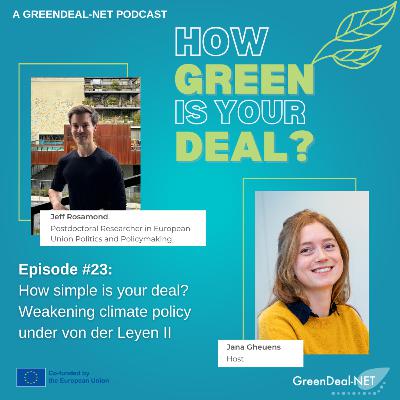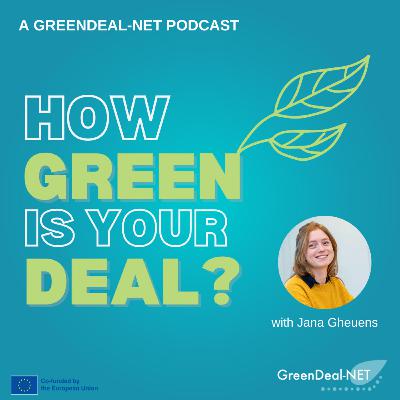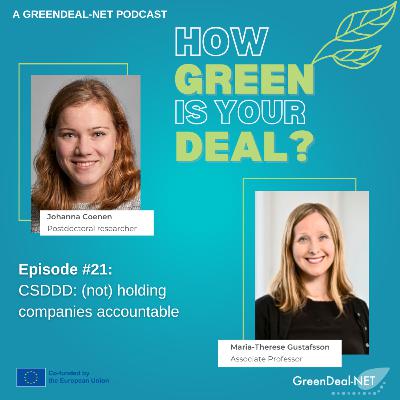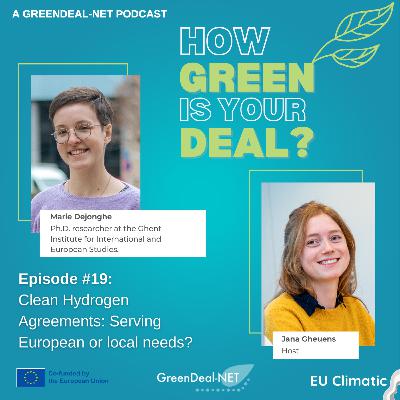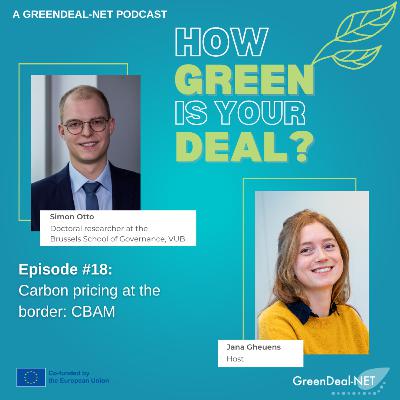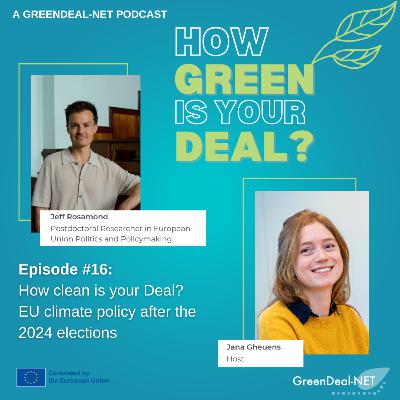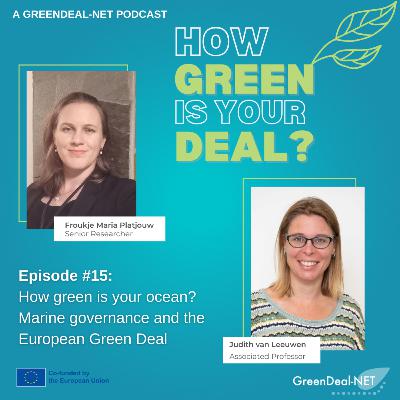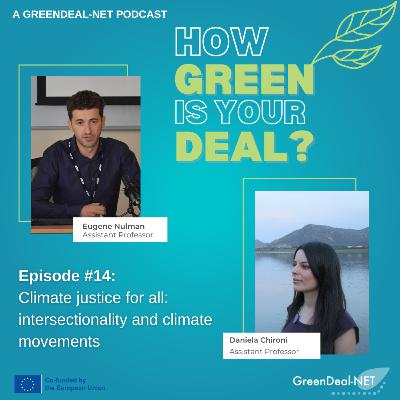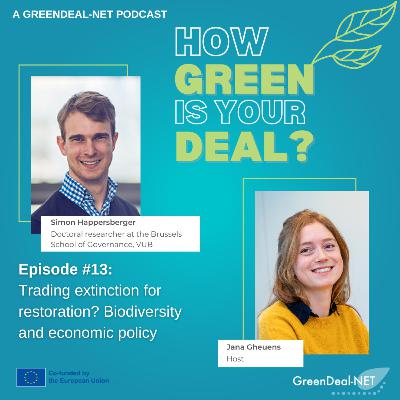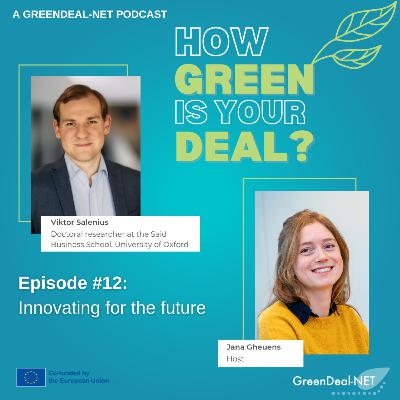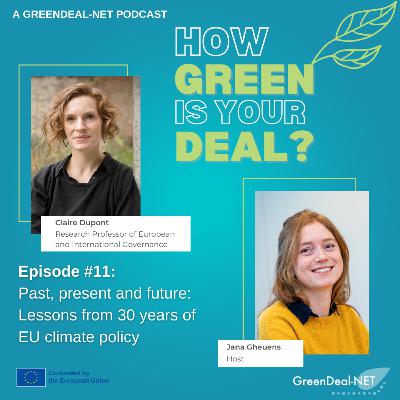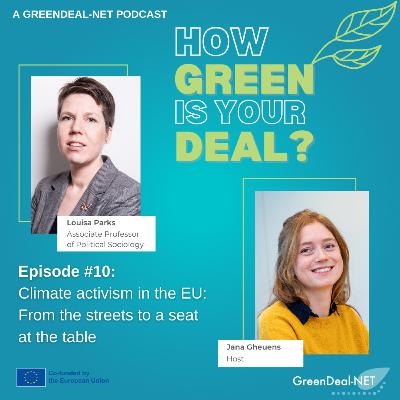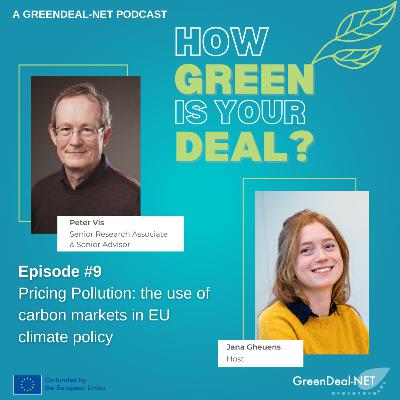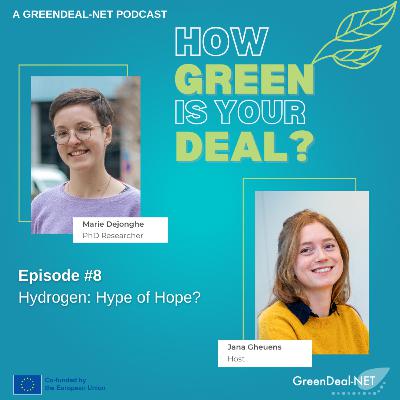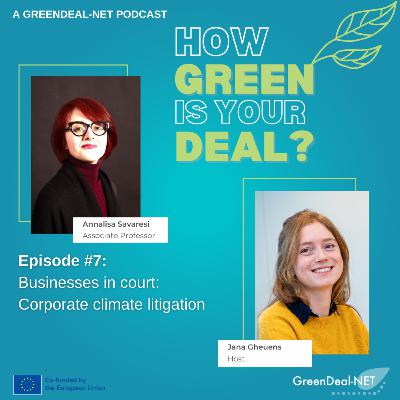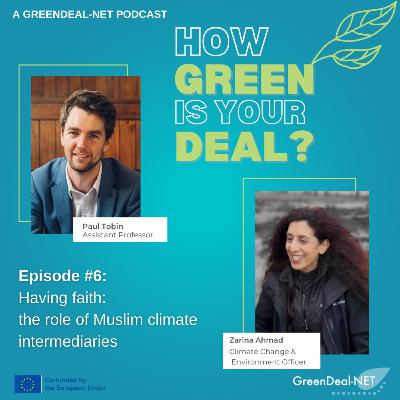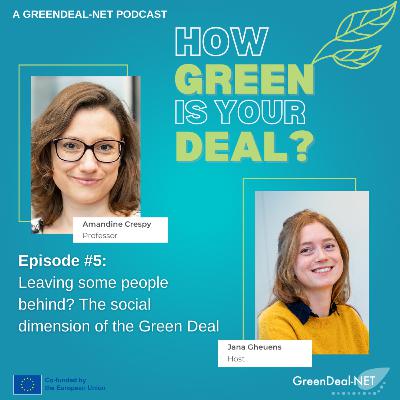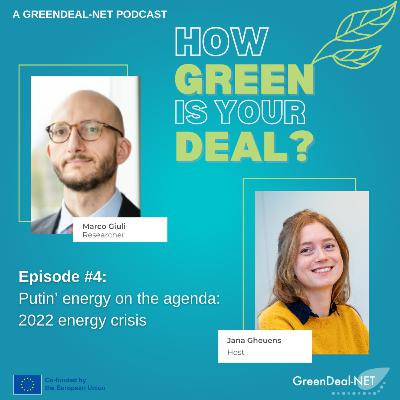Discover How Green Is Your Deal?
How Green Is Your Deal?

How Green Is Your Deal?
Author: GreenDeal-NET
Subscribed: 5Played: 90Subscribe
Share
© GreenDeal-NET
Description
Stay on top of the latest insights in EU climate policy by listening to How Green Is Your Deal? In 20-to-30-minute episodes, host and researcher Jana Gheuens talks with leading climate experts about their views on the EU climate transition. Topics include everything from carbon pricing, the role of climate activism and NGOs, to how to integrate climate action in all the EU’s policy measures.
Co-funded by the EU. Views and opinions expressed are however those of the author(s) only and do not necessarily reflect those of the EU or the European Education and Culture Executive Agency (EACEA).
Co-funded by the EU. Views and opinions expressed are however those of the author(s) only and do not necessarily reflect those of the EU or the European Education and Culture Executive Agency (EACEA).
24 Episodes
Reverse
In this episode, we take stock of one year of climate policy developments under von der Leyen II. What does the shift in priorities from a European Green Deal to a Clean Industrial Deal mean for climate legislation? How has the success of far-right parties in the European Parliament and in the EU member states impacted discussions on climate files?Jeff Rosamond, a postdoctoral researcher at Ghent University, joins us for this episode to discuss these questions and more. To stay up to date on ‘How Green is Your Deal?’ episodes, pleasefollow the host Jana Gheuens on Bluesky or Linkedin, or sign up for the GreenDeal-NET newsletter. Music: ‘Lazy Walk’ by Cheel.
We end our series on the external dimension of EU climate governance with reflections from policymaking itself.Jacob Werksman, Principal Adviser to the European Commission on international aspects of EU climate policy, shares his insights on how science meets politics and economics in EU climate policy, how changes in the international system impact it, and what we can expect from global and EU climate policy in the coming years.Music: ‘Lazy Walk’ by Cheel
The EU imports large amounts of products from the Global South each year. Unfortunately, their production is often associated with child labor, human rights violations, and ecological damage. To combat these issues and to hold companies accountable for the products they sell, the EU has introduced the Corporate Sustainability Directive or CSDDD. However, the CSDDD has found itself in the crosshairs of ongoing turbulence within and outside of the EU. To help us understand the CSDDD’ objectives, its potential impacts on companies and local stakeholders, and how it has been affected by turbulence, Maria-Therese Gustaffson and Johanna Coenen join us for this episode. Stay on top of their latest work on the topic by following their ‘Corporate accountability in global supply chains?’ research project.Music: ‘Lazy Walk’ by Cheel
Climate change is reshaping the geopolitical landscape at the top of world with global powers showing increasing interest in the region. This episode explores why the region is so important, why tensions are rising now, and what role the EU plays in all of this.Aslak Busch joins us for this episode to share his expertise the Arctic and the geopolitics of the North. This episode is part of a series on the global dimension of EU climate action. Subscribe now to not miss an episode!Music: ‘Lazy Walk’ by Cheel
The EU is increasingly looking to import clean hydrogen to provide an alternative fuel source for the industry and transport sectors, and to meet its decarbonization targets. Often, this means setting up agreements with countries in the Global South. At first sight, these could be mutually beneficial, but recently they have received a lot of criticism. Critics argue that they go against local needs and view them as a form of green colonialism.Marie Dejonghe gives her insights on clean hydrogen partnerships, their risks and how to make them more equitable.This episode is part of a series on the global dimension of EU climate action. Subscribe now to not miss an episode!Music: ‘Lazy Walk’ by Cheel
The Carbon Border Adjustment Mechanism forms a key part of the European Green Deal, but what does it actually do andhow have other countries responded to it? Simon Otto joins us in this episode to share his insights on the functioning of carbon pricing at the border, how it is perceived and how it is affected by the current turbulence in the world. To learn more about CBAM, you read Simon’s latest article on "The external impact of EU climate policy: political responses to the EU’s carbon border adjustment mechanism". It’s open access: https://link.springer.com/article/10....This episode is part of a series on the global dimension of EUclimate action. Subscribe now to not miss an episode!Music: ‘Lazy Walk’ by Cheel
The world around the EU is rapidly shifting. With the return ofDonald Trump and the US’ withdrawal out of the Paris Agreement and ongoing and new conflicts reshaping global alliances, can the EU maintain its role as a global climate leader?In this episode, Joseph Earsom and Franziska Petri join us toexplore how shifting power dynamics, economic pressures and security concerns impact the EU’s external climate capabilities in a changing world.This episode is the first one in a series on the global dimensionof EU climate action. Subscribe now to not miss an episode! Music: ‘Lazy Walk’ by Cheel
The 2024 European elections announced the start of a new European
policy cycle, as not only a new European Parliament was elected but also a new
European Commission term started. On the heels of far-right successes in EU
Member States elections, citizens elected a more rightwing European Parliament.
Furthermore, even though von der Leyen will stay on as Commission President,
changes in her Commission structure and political guidelines could indicate a
move away from climate change as the top priority.
Jeff Rosamond, a postdoctoral researcher at Ghent University, joins
us for this episode to help us understand the elections and their possible
impact on climate policy.
This will be the final episode (for now). To stay up to date on
further developments, you can follow the host Jana Gheuens on Bluesky or Linkedin,
or you can sign up for the GreenDeal-NET newsletter.
Music: ‘Lazy Walk’ by Cheel.
Oceans are at the forefront of climate change. As the biggest carbon sink, they play an important role in absorbing greenhouse gas emissions from the atmosphere. However, this absorption also heats up the ocean and results in ocean acidification, with significant negative consequences for marine ecosystems and the people who depend on them for their livelihood. At the same time, it has also become one of the prime locations for renewable energy generation.
In this episode, Froukje Maria Platjouw and Judith van Leeuwen, marine governance experts, share their insights on how the EU governs its oceans and seas, how it features into the European Green Deal, and the challenges sustainable marine governance faces.
For more information on their Horizon Europe research projects, which study how to navigate the complexity of EU marine governance under the European Green Deal to develop a coherent and integrated EU ocean policy framework, you can go here: CrossGov and PERMAGOV.
Music: ‘Lazy Walk’ by Cheel.
While climate change impacts everyone, some communities are disproportionally affected over others. Therefore, climate movements have put focus on the concept of ‘intersectionality’ in their fight against climate change. Clear examples of this are the chant of ‘Climate Justice is Racial Justice’ that gained traction during the Black Lives Matter protests of 2020, and the explicit connection between climate action and support for Palestine during Israel’s ongoing war on Gaza. However, the latter also showed that there can be internal contention in climate movements as some argue to separate broader politics from addressing climate change.
Eugene Nulman and Daniela Chironi share their insights on this topic in this episode to help us understand how climate change and intersectionality are linked, and what it means for climate movements.
Music: ‘Lazy Walk’ by Cheel.
Scientists argue that we are entering a sixth mass extinction event as biodiversity is declining at an unprecedented
rate. In contrast to prior mass extinction events caused by natural phenomena, this extinction event is the result of human activity leading to climate change or habitat degradation.
Simon Happersberger, researcher at the Brussels School of Governance working on sustainable trade, joins us today to
discuss the linkages between biodiversity and economic policy and trade.
The EU’s transition to climate neutrality requires significant efforts from all economic sectors. A key requirement for sectors to move to more sustainable practices is the availability of alternative climate-friendly technologies. Developing these requires innovation and strong investments. How do you create the right conditions for innovation to flourish? What can be improved from our current circumstances?
To help us better understand the role of innovation in industry decarbonization, we are joined by Viktor Salenius, a researcher at Oxford University who works on innovation and the green transition in energy-intensive industries.
Music: ‘Lazy Walk’ by Cheel.
The EU has a long history of formulating climate policies resulting in the European Green Deal. What are some of the trends that have emerged over the last 30 years and does the Green Deal break away from them? What can they tell us about the future of EU climate policy?
In this episode, Claire Dupont shares her insights on the past, present and future of climate governance.
You can read the GreenDeal-NET state-of-the-art review ‘Three decades of EU climate policy: Racing toward climate neutrality?’ lead-authored by Claire to delve deeper into
this topic.
Music: ‘Lazy Walk’ by Cheel.
Greta Thunberg and the climate youth ignited a wave of climate activism in the EU. People took to the streets in mass protests, and groups like Extinction Rebellion started to use some more disruptive tactics. How can we understand these types of activism and what has been their impact on EU climate policy?
Louisa Parks joins us in this episode to share her insights on climate
activism in the EU and the direct and indirect effects it has had.
To learn more about this topic, you can read the GreenDeal-NET policy options paper on ‘Contemporary Climate Activism and EU Climate Policy'.
Carbon pricing has been at the heart of EU climate and energy policy since the very beginning with the development of the EU Emission Trading System (EU ETS). As part of the European Green Deal, the EU has expanded the EU ETS to include new sectors and has set up a scheme to price carbon at an international level. How do these instruments work and what are their social implications?
To help us answer these questions, we are joined by Peter Vis, a renowned expert with many years of experience on the matter.
Music: ‘Lazy Walk’ by Cheel.
Hydrogen is often portrayed as the fuel for the future and it seems to be the solution to every aspect of the climate crisis. But what is hydrogen and can it live up to its promises?
Marie Dejonghe, researcher at Ghent University, joins us in this episode to answer these questions and more. Together, we explore what makes hydrogen sustainable and how it can feature in the EU’s green transition.
We often hear that a
mere 100 companies are accountable for approximately 70% of global emissions.
But what does this responsibility truly mean, and how can corporations be held
accountable for their environmental impact?
In this episode, Annalisa Savaresi, expert on International Environmental Law at the University of Eastern Finland, shares her insights on the role of corporations in climate change, how they can be held accountable and what the role of climate litigation can be.
If you want to learn more about this topic, Annalisa recently published an article on the topic in Regulation and Governance, co-authored with Mikko Rajavuori and Harro van Asselt. They have also written a blog post based on the article.
Music: ‘Lazy Walk’ by Cheel.
In today's increasingly complex world, addressing the urgent issue of climate change requires collaboration across different levels of governance and diverse actors. Climate intermediaries take up the important role of connecting these levels and/or actors with each other to inspire more climate action.
In this episode, Paul Tobin and Zarina Ahmad join us to delve deep into the concept of climate intermediaries with a specific focus on how faith and sustainability can be linked. They also share their insights on the barriers Muslim actors face and on how to make sure their voices are heard.
If you are interested in this topic, you can read their article ‘“The religions are engaging: tick, well done”: the invisibilization and instrumentalization of Muslim climate intermediaries’, co-authored by Nafhesa Ali and Sherilyn MacGregor.
Music: ‘Lazy Walk’ by Cheel.
The European Green Deal is the EU’s growth strategy to make its economy more sustainable. Doing so will require a far-reaching transformation of society that will greatly impact European citizens’ lives and livelihoods.
In this episode, Amandine Crespy, professor at ULB, discusses the social implications of the European Green Deal, what the EU is doing to make sure the green transition leaves no one behind, and whether its efforts are sufficient.
If you want to learn more about this topic, Amandine has recently published an article on ‘Lost in transition? Social justice and the politics of the EU green transition’ co-authored with Mario Munta.
Music: ‘Lazy Walk’ by Cheel.
After Russia invaded Ukraine in 2022, Europe was plunged into an energy crisis. Energy prices skyrocketed, there seemed to be a scramble for alternative energy sources, and European citizens were urged to consume less energy.
To help us understand what caused the energy crisis, and how it impacted the EU’s climate objectives, we are joined by Marco Giuli, an expert on EU energy policy and climate policy integration (Brussels School of Governance, VUB).
If you want to learn more about this topic, check out Marco’s articles ‘Third time lucky? Reconciling EU climate and external energy policy during energy security crises’, co-authored with Sebastian Oberthür in the Journal of European Integration, and 'Assessing the EU’s Evolving Position in Energy Geopolitics under Decarbonisation’, also co-authored with Sebastian Oberthür in the International Spectator.
Music: ‘Lazy Walk’ by Cheel.


